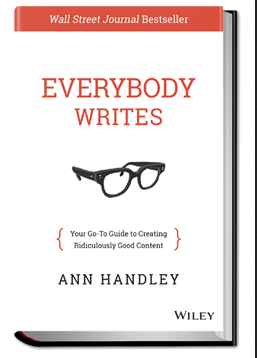Interview with Ann Handley, author of “Everybody Writes”
 Everybody Writes by Ann Handley is a spectacularly useful book about writing, organized into 74 bite-sized chunks. Ann and I look at the world through the same eyes, and we are fighting the same fight — to help you express yourself more clearly. Here’s my interview with her:
Everybody Writes by Ann Handley is a spectacularly useful book about writing, organized into 74 bite-sized chunks. Ann and I look at the world through the same eyes, and we are fighting the same fight — to help you express yourself more clearly. Here’s my interview with her:
Why a book on writing now? There are so many books — what is the key insight in your book that’s what we need right now?
In our noisy world, writing with economy, clarity, and honest empathy is key. Being able to communicate well in writing isn’t just nice; it’s necessary.
There are a lot of great books on writing — Bird by Bird and The Elements of Style are two of my own go-to sources. But what’s harder to find is a book that functions for businesses as part writing-and-story guide, part handbook on the ground rules of good sportsmanship in content marketing, and all-around reliable desk companion for anyone creating or directing content on behalf of brands.
Your book is effectively a lot of rules — many dozens of them in small chapters. They’re all great, but I worry that the minute a person touches the keyboard, they’ll be paranoid they’re getting it wrong. What’s your experience?
I worried about that, too. But really the so-called rules are more a handy set of guidelines — like bumpers on a bowling lane that nudge the ball away from the gutter.
You dump on how people learn to write in high school and college. What needs to change in how we prepare people for writing in the real world?
The other day I was proofreading a paper for my daughter Caroline, who’s in high school. She warned me ahead of time: “I know you’ll think the paragraphs are too long, but it has to stay five paragraphs.” Her teacher had instructed her students to adhere to the famous (infamous?) five-paragraph essay, a plodding structure many of us learned in high school.
There are two problems with that: 1) Caroline’s essay wasn’t being graded as much on readability or clarity or awesomeness as it was on adhering to a forced, silly construct; and 2) it implies that there is one way to write. There isn’t.
(There is no one way to write – just as there is no one way to roast a turkey or raise a child.)
How much of the time for a piece should people spend on writing, and how much on rewriting? How can you make sure that each draft gets better than the last one?
We all should spend as much time rewriting as writing. Rewriting tends to get short shrift, many think of it as about as much fun as sorting socks. But rewriting is the opportunity to swap places with your reader – once the first draft is out of your head and onto the page.
Being a skeptic of your own work is the key to making sure each draft improves upon the last. (Could I have said this more simply or clearly? Have I said something unavoidably ugly or awkward?)
Email is something that we all write, typically poorly. What are your top tips on writing email effectively?
Don’t make me work too hard:
- Use short sentences.
- Use short paragraphs.
- Use bullets.
- Make the Call to Action ridiculously prominent. (Tell me what you want me to do!)
Is there any use for press releases, or are they worthless?
I don’t think press releases are worthless. But I do think many miss the mark. Most of them still read like pitch-slaps, when really they should inspire me to care.
Who should blog, and why?
Everyone should blog (even if they don’t publish). Because writing is thinking. (And everyone should think.)
Most of the content on the Internet sucks. Do you really think you can make things any better?
Yes. Because I’ve never met anyone who wasn’t interested in writing better than they do now. (That category includes me.)
Photo: Mike Olliver.

Re “everyone should blog”: I’ve been around the net a long time. Long enough that I remember the earlier days of personal writing one the net, and it was very clear there was a gender divide: Women wrote journals or diaries; Guys wrote blogs. it was pretty obvious why – a lot of guys (though not all) didn’t want girl cooties on their personal writing. As is the way of thing a lot of the time, the guys’ term won out.
Re most of the content on the Internet sucks: I’m reminded of the full story behind Sturgeon’s Law. One time, Ted Sturgeon was asked why he wrote that silly science fiction stuff, when he was such a good writer, and so much science fiction was crap. Sturgeon’s reply: “Sure, 90% of science fiction is crap, but 90% of everything is crap.” When quoted, it’s usually one clause or the other. Me, I think context matters.